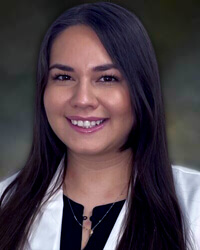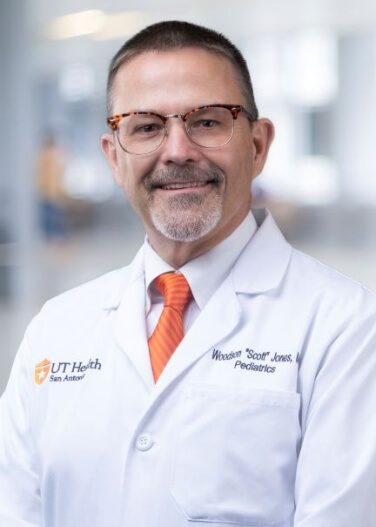To family medicine physician Lizette Lugo, MD, certain non-medical experiences shape every visit she has with her patients.
“Those non-medical drivers will determine whether my patient has to choose between picking up the prescription I sent to the pharmacy or buying food for their children, whether they are late to my appointment because the bus wasn’t on time or simply a no-show because they could not afford to miss a day of work,” says Lugo, institutional quality chief resident for health system science at The University of Texas Health Science Center at San Antonio (UT Health San Antonio). “These experiences are what make a patient a person.”

Approximately 250 residents and fellows-in-training attended the annual Non-Medical Drivers of Health Training, hosted by UT Health San Antonio’s Office of Graduate Medical Education in collaboration with University Health, on Tuesday, June 18, where trainees were told they’ll learn not only about how diseases affect the human body but how social facets affect people.
Also known as social drivers or determinants of health, those non-medical experiences are defined as conditions in the environments where people are born, live, learn, work, play, worship and age that affect a wide range of health, functioning and quality-of-life outcomes and risks.
The event took place that day at Holly Auditorium and the Academic and Learning Center (ALTC), on the university’s main campus.
This year, interactive workshops immersed learners in dynamic, hands-on sessions to develop non-medical drivers of health responsive care plans through collaborative case studies. This will equip them with practical skills and actionable insights to enhance health equity and outcomes in their own practices.

“Traditionally, physicians have concentrated primarily on medical conditions directly impacting health, often feeling too preoccupied to address other factors,” said Woodson “Scott” Jones, MD, vice dean for graduate medical education and designated institutional official professor of pediatrics at UT Health San Antonio. “However, there’s a growing recognition that these non-medical drivers substantially impact health.
“Consequently, the notion of being ‘too busy’ to address these factors is no longer viable,” he said. “While physicians may not be able to address or screen for all these issues directly, it’s essential for our new physicians to be aware of these drivers, know who can screen for them, and ensure support teams connect patients with appropriate resources from community partners. The commitment to improving health in San Antonio necessitates a holistic approach that extends beyond traditional health care settings.”
Aside from Jones, and Bryan Alsip, MD, CMO, University Health, speakers presenting at the event included:
-

Vasan Ramachandran, MD Vasan Ramachandran, MD, inaugural dean and professor of The University of Texas School of Public Health San Antonio, keynote address
- Christine Drennon, PhD, director and associate professor of urban studies, Trinity University, “History of Redlining in San Antonio and the Impact on SDOH”
- Lyssa Ochoa, MD, board-certified vascular surgeon and founder of the San Antonio Vascular and Endovascular Clinic (The SAVE Clinic) in south San Antonio, “Current Needs in San Antonio”
- Ed Banos, incoming president and CEO, University Health, “Commit to Sit and Patient Family Centered Care”
- Junda Woo, MD, MPH, medical director, Local Health Authority, San Antonio Metropolitan Health District, “SDOH Screening Tools and Community Resources”
Graduate medical education counselors as well as care coordinators from University Health and the VA also led sessions.
The event is an immersive training experience highlighting existing challenges to addressing non-medical drivers impacting health in the current health care ecosystem. It is part of an overall strategy to create a more equitable health care environment, remove barriers and support communities in South Texas in achieving their best overall health.
“Throughout this training, we highlight the non-medical factors that significantly impact the health outcomes of our community members, fostering a deep understanding of the root causes of health disparities,” said Bianca Rodriguez, health systems science manager at UT Health San Antonio. “By gaining this knowledge, our trainees develop a heightened awareness of the intricate complexities within patients’ lives while learning to appreciate a patient’s background and contexts that shape their health experiences.”
Programs featured at the event’s resource fair this year included:
- SA Kids BREATHE (SAKB): SAKB is a free city program whose primary goal is to improve the quality of the lives of children with asthma by teaching them and their family best practices to control their asthma. The SAKB program will help keep kids out of the hospital, keep kids in school, keep parents at work, and save families and health care systems money. https://www.sanantonio.gov/Health/HealthServices/Asthma
- The City of San Antonio’s Metropolitan Health District’s (Metro Health) Diabetes Prevention & Control program provides health education to the community specifically designed for people living with diabetes. Metro Health offers the Diabetes Self-Management program to people living with diabetes, and the Diabetes Prevention Program for people at risk for developing diabetes. https://311.sanantonio.gov/kb/docs/articles/health-and-social-services/diabetes-help-sa
- University Health’s Institute for Public Health: The Institute for Public Health is leading the way to improve the good health of our community by eliminating health disparities and achieving health equity in Bexar County.LINK: https://www.universityhealth.com/public-health/home
For more information about non-medical drivers of health, watch this video.
Learn more here about the non-medical drivers of health training at UT Health San Antonio.
“Social determinants are where the heart of medicine lies: humanity,” Lugo said. “We have the privilege to work with a special and vulnerable population during our training at UT Health San Antonio and University Health. The experiences that residents and fellows-in-training will have over the next few years will shape the physicians they will be for the rest of their careers.”



